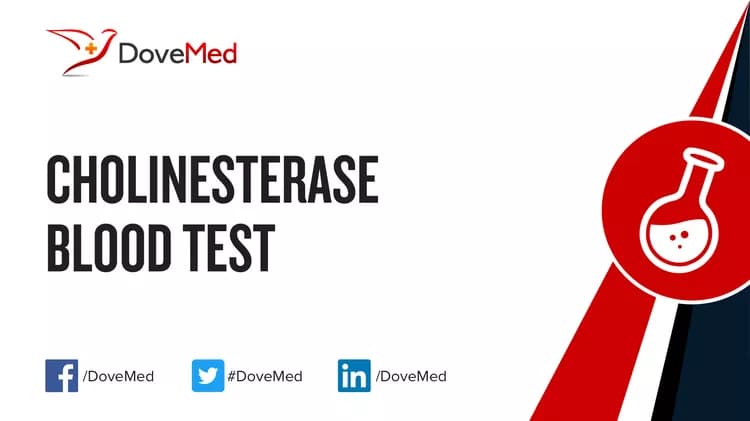What are the other Names for this Test? (Equivalent Terms)
- AChE Blood Test
- BChE Blood Test
- Butyrylcholinesterase Blood Test
What is Cholinesterase Blood Test? (Background Information)
Cholinesterases are degradative enzymes important for healthy nervous system function. There are two types of cholinesterases: Acetylcholinesterase (AChE) and butyrylcholinesterase (BChE)
Acetylcholinesterase (AChE):
- AChE is present in the meeting place between neurons and muscle cells. This is called the neuromuscular junction
- For the brain to stimulate a muscle, electrical impulses are carried from neuron to neuron, eventually reaching the neuromuscular junction. The neuron then releases a neurotransmitter called acetylcholine (ACh)
- Neurotransmitters are chemical messengers. In this case, ACh binds to receptors on the muscle, providing information for the muscle to contract. The muscle will continue contracting as long as the ACh remains bound
- Acetylcholinesterase, AChE, degrades the ACh on the muscle’s receptors. This prevents overstimulation of muscular contraction. A problem with AChE would lead to prolonged muscular contractions and spasms
Butyrylcholinesterase (BChE or pseudocholinesterase):
- Butyrylcholinesterase (BChE), the other kind of cholinesterase, is found in the blood, liver, and heart
- BChE performs a degradative function similar to AChE, but it recognizes a different target. The main target of BChE is butyrylcholine (BCh)
- Unlike ACh, BCh is not naturally produced by the body. Instead, it is associated with certain surgical anesthetics and recreational drugs
- A problem with BChE may lead to delayed breakdown of these compounds. Problems with AChE and BChE may occur due to pesticide exposure or genetic defects in these enzymes
The Cholinesterase Blood Test is a test to evaluate the levels of AChE and BChE in blood to detect deficiencies. BChE may also be tested prior to surgery, to determine if an individual’s metabolism of anesthetics is decreased.
What are the Clinical Indications for performing the Cholinesterase Blood Test?
Following are the clinical indications for performing the Cholinesterase Blood Test:
- Family history of cholinesterase deficiency
- Exposure to insecticides, especially if working in the agricultural industry
- Complications following surgery, including:
- Inability to breathe for short durations (apnea)
- Muscle paralysis
How is the Specimen Collected for Cholinesterase Blood Test?
Following is the specimen collection process for Cholinesterase Blood Test:
Sample required: Blood
Process of obtaining blood sample in adults:
- A band is wrapped around the arm, 3-4 inches above the collection site (superficial vein that lies within the elbow pit)
- The site is cleaned with 70% alcohol in an outward spiral, away from the zone of needle insertion
- The needle cap is removed and is held in line with the vein, pulling the skin tight
- With a small and quick thrust, the vein is penetrated using the needle
- The required amount of blood sample is collected, by pulling the plunger of the syringe out slowly
- The wrap band is removed, gauze is placed on the collection site, and the needle is removed
- The blood is immediately transferred into the blood container, which has the appropriate preservative/clot activator/anti-coagulant
- The syringe and the needle are disposed into the appropriate “sharp container” for safe and hygienic disposal
Preparation required: No special preparation is needed prior to the test.
What is the Significance of the Cholinesterase Blood Test Result?
Decreased cholinesterase levels may indicate:
- Toxic insecticide exposure
- Paroxysmal nocturnal hemoglobinuria
- Relapse of megaloblastic anemia
The laboratory test results are NOT to be interpreted as results of a "stand-alone" test. The test results have to be interpreted after correlating with suitable clinical findings and additional supplemental tests/information. Your healthcare providers will explain the meaning of your tests results, based on the overall clinical scenario.
Additional and Relevant Useful Information:
- Pregnancy may interfere with the results of the Cholinesterase Blood Test
- Deficiencies in butyrylcholinesterase occur in 1 out of every 1500 individuals administered surgical anesthesia
Certain medications that you may be currently taking may influence the outcome of the test. Hence, it is important to inform your healthcare provider, the complete list of medications (including any herbal supplements) you are currently taking. This will help the healthcare provider interpret your test results more accurately and avoid unnecessary chances of a misdiagnosis.
Please visit our Laboratory Procedures Center for more physician-approved health information:
http://www.dovemed.com/common-procedures/procedures-laboratory/
Related Articles
Test Your Knowledge
Asked by users
Related Centers
Related Specialties
Related Physicians
Related Procedures
Related Resources
Join DoveHubs
and connect with fellow professionals


0 Comments
Please log in to post a comment.